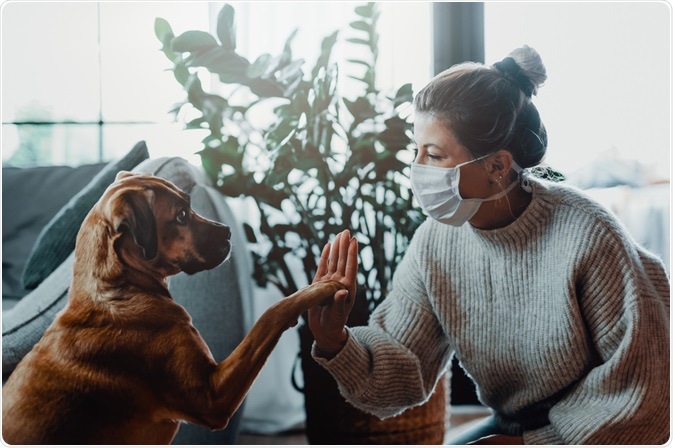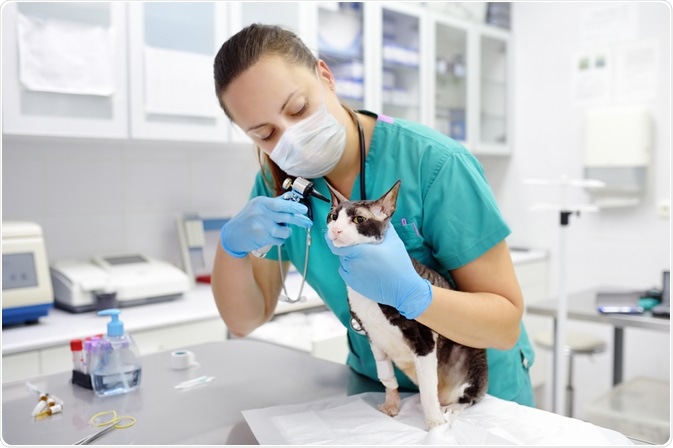Can Pets Get COVID-19?
A novel coronavirus that was first reported in China in December 2019 quickly led to a global pandemic. Named COVID-19, the virus has had a devastating effect on economies and healthcare systems worldwide.
Whilst highly contagious between humans, evidence of transmission from animals to humans is limited, although human to animal transmission is possible. The following article discusses the care that should be taken with regards to domestic pets and COVID-19.
 Current evidence indicates that whilst dogs can become infected following contact with infected humans, it is rare, they display mild or no symptoms and they cannot transmit the infection further. Image Credit: MT-R / Shutterstock.com
Current evidence indicates that whilst dogs can become infected following contact with infected humans, it is rare, they display mild or no symptoms and they cannot transmit the infection further. Image Credit: MT-R / Shutterstock.com
The COVID-19 pandemic
The coronavirus disease 2019 (COVID-19) pandemic is a current global disease outbreak first identified in December 2019 in Wuhan, China. Subsequently named the severe acute respiratory syndrome coronavirus 2 (SARS-CoV-2), it belongs to a large family of viruses named Coronaviridae.
Some strains belonging to the Coronaviridae family affect humans, such as the Severe Acute Respiratory Syndrome (SARS), and some can affect animals such as kennel cough in dogs or feline infectious peritonitis (FIP) in cats. However, some strains can affect both humans and animals.
Can my pet develop COVID-19?
Some species can contract COVID-19 following close contact with infected humans. In Hong Kong, 17 dogs and 8 cats that had been residing with COVID-19 infected patients were tested by health officials who found evidence of the infection in two dogs. Cases of infected cats have been reported in Hong Kong and Belgium.
In Wuhan, researchers examined serum samples from 102 cats and found COVID-19 antibodies in 15 of the sample. However, whilst animals can become infected, they do not necessarily develop symptoms or become infectious to humans. Evidence collected to date indicates that the following domestic animals are susceptible to contracting the virus:
- Dogs: Whilst dogs can become infected following contact with infected humans, it is rare, they display mild or no symptoms and they cannot transmit the infection further.
- Rabbits: Similar to dogs, whilst rabbits can become infected, they show no symptoms and do not transmit the virus to other rabbits or other species.
- Cats: Can catch COVID-19 from infected humans but display mild or no symptoms. Whilst they can spread the infection to other cats, there is no evidence to date that they transmit back to humans.
- Ferrets: Ferrets are susceptible to COVID-19 infection, do display symptoms and can pass the infection to other ferrets. Although there is no evidence of ferrets transmitting the disease back to humans, data from studies of mink infectious indicate a potential for ferrets to re-infect humans.

Current evidence indicates that cats can catch COVID-19 from infected humans but display mild or no symptoms. Whilst they can spread the infection to other cats, there is no evidence to date that they transmit back to humans. Image Credit: Maria Sbytova / Shutterstock.com
How should pets who test positive for COVID-19 be managed?
Based upon the currently available evidence, the minority of pets who have become infected with COVID-19 display mild or no symptoms and can be managed at home. As the risk of pets playing a role in the spreading of the disease is low, testing of pets is only recommended when an animal develops symptoms and has been in contact with an infected human.
The Centers for Disease Control and Prevention (CDC) have issued the following guidance for pet owners if their animal tests positive for COVID-19.
Quarantine your pet
Infected pets should be kept at home unless seeking veterinarian care, in which case the veterinarian clinic should be notified ahead of time in order to take appropriate infection control measures. During quarantine, pets should not visit human medical centers, places of education, groomers or day-care.
They should be kept away from areas where others may gather such as parks and should only be cared for and exercised by people within their household. If dog owners have a private garden, then dogs should not be taken on walks.
If they do not have access to private outside space, then dogs should only be taken for brief breaks for toileting and should be kept at least six feet from other pets and humans. Infected cats should be kept inside.
They should be quarantined from other pets and humans within the household in a separate room when possible. Contact with the infected pet should be avoided, and they should be provided with separate bedding, feeding and toileting areas to other pets.
Monitor symptoms
The type and severity of symptoms displayed by an infected pet should be tracked and reported to your veterinarian. Typical COVID-19 symptoms in animals include fever, lethargy, coughing and sneezing, eye discharge and gastric problems such as vomiting and diarrhea. If symptoms appear to be worsening, or the pet develops difficulty breathing a veterinarian should be contacted as soon as possible.
Take precautions
Pet owners should ensure they wear a mask and gloves when they are in the same room as an infected pet. When handling feeding bowls, toys or bedding or clearing up waste products, gloves should always be worn, and hands should be thoroughly washed with soap and water afterward.
If access to handwashing facilities is not available, appropriate hand sanitizer may be used. Pet owners should be particularly careful not to touch their face before hand washing.
As there is currently no evidence that washing pets reduces the spread of COVID-19, infected pets should not be bathed more than usual. They should not be exposed to any chemical disinfectants as these could cause serious illness or death. However, household surfaces should be regularly disinfected.
Ending quarantine
Guidance from a veterinarian should always be sought before allowing the pet to mix with other animals and humans. In most cases, quarantine can be ended if the pet has been symptom-free for at least 3 days and either 14 days has elapsed since the pet tested positive for COVID-19, or if follow-up testing has returned a negative result.
For more information on what to do if you think your pet has COVID-19, visit the CDC website.
References
- Centers for Disease Control and Prevention. 2021. COVID-19 And Your Health. [online] Available at: <https://www.cdc.gov/coronavirus/2019-ncov/animals/pets-other-animals.html> [Accessed 14 January 2021].
- Mahdy, M., Younis, W., & Ewaida, Z. (2020). An Overview of SARS-CoV-2 and Animal Infection. Frontiers in veterinary science, 7, 596391. https://doi.org/10.3389/fvets.2020.596391
- Oregonvma.org. 2021. COVID-19: Coronavirus & Pets FAQ | Oregon Veterinary Medical Association. [online] Available at: <https://www.oregonvma.org/care-health/zoonotic-diseases/coronavirus-faq> [Accessed 14 January 2021].
- Ye, Z. W., Yuan, S., Yuen, K. S., Fung, S. Y., Chan, C. P., & Jin, D. Y. (2020). Zoonotic origins of human coronaviruses. International journal of biological sciences, 16(10), 1686–1697. https://doi.org/10.7150/ijbs.45472
- Zhang, Q., Zhang, H., Gao, J., Huang, K., Yang, Y., Hui, X., He, X., Li, C., Gong, W., Zhang, Y., Zhao, Y., Peng, C., Gao, X., Chen, H., Zou, Z., Shi, Z. L., & Jin, M. (2020). A serological survey of SARS-CoV-2 in cat in Wuhan. Emerging microbes & infections, 9(1), 2013–2019. https://doi.org/10.1080/22221751.2020.1817796
Further Reading
- All Coronavirus Disease COVID-19 Content
- What Mutations of SARS-CoV-2 are Causing Concern?
- What is the Clinical Impact of COVID-19 on Cancer Patients?
- An Overview of the SARS-CoV-2 Vaccines
- Repurposing Drugs for COVID-19
Last Updated: Jan 22, 2021

Written by
Clare Knight
Since graduating from the University of Cardiff, Wales with first-class honors in Applied Psychology (BSc) in 2004, Clare has gained more than 15 years of experience in conducting and disseminating social justice and applied healthcare research.
Source: Read Full Article
